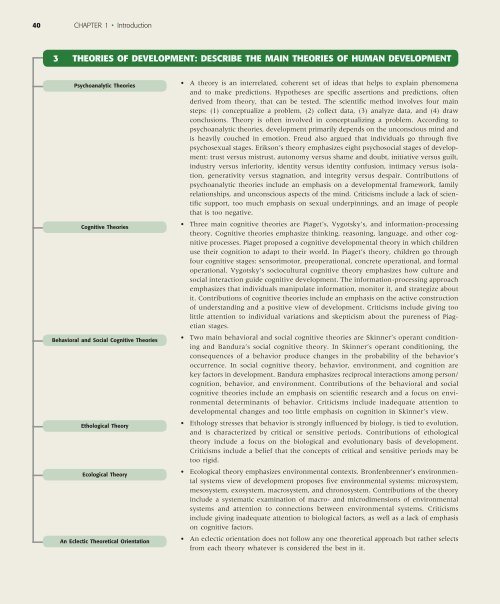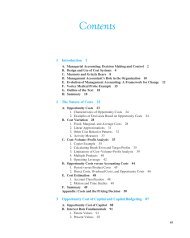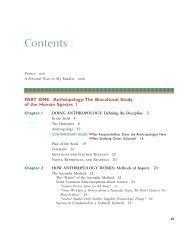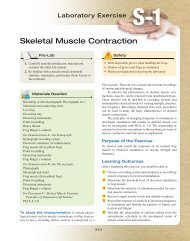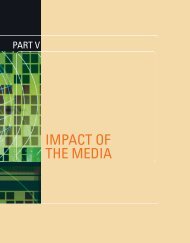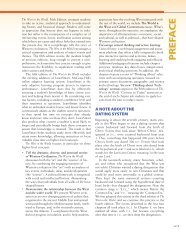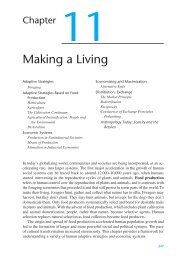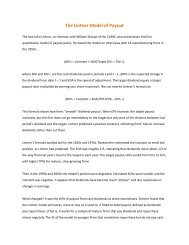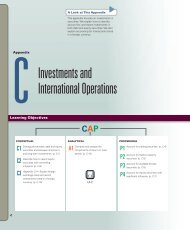Research in Life-Span Development
Research in Life-Span Development
Research in Life-Span Development
Create successful ePaper yourself
Turn your PDF publications into a flip-book with our unique Google optimized e-Paper software.
40 CHAPTER 1 Introduction<br />
3 THEORIES OF DEVELOPMENT: DESCRIBE THE MAIN THEORIES OF HUMAN DEVELOPMENT<br />
Psychoanalytic Theories<br />
Cognitive Theories<br />
Behavioral and Social Cognitive Theories<br />
Ethological Theory<br />
Ecological Theory<br />
An Eclectic Theoretical Orientation<br />
A theory is an <strong>in</strong>terrelated, coherent set of ideas that helps to expla<strong>in</strong> phenomena<br />
and to make predictions. Hypotheses are specifi c assertions and predictions, often<br />
derived from theory, that can be tested. The scientifi c method <strong>in</strong>volves four ma<strong>in</strong><br />
steps: (1) conceptualize a problem, (2) collect data, (3) analyze data, and (4) draw<br />
conclusions. Theory is often <strong>in</strong>volved <strong>in</strong> conceptualiz<strong>in</strong>g a problem. Accord<strong>in</strong>g to<br />
psychoanalytic theories, development primarily depends on the unconscious m<strong>in</strong>d and<br />
is heavily couched <strong>in</strong> emotion. Freud also argued that <strong>in</strong>dividuals go through fi ve<br />
psychosexual stages. Erikson’s theory emphasizes eight psychosocial stages of development:<br />
trust versus mistrust, autonomy versus shame and doubt, <strong>in</strong>itiative versus guilt,<br />
<strong>in</strong>dustry versus <strong>in</strong>feriority, identity versus identity confusion, <strong>in</strong>timacy versus isolation,<br />
generativity versus stagnation, and <strong>in</strong>tegrity versus despair. Contributions of<br />
psychoanalytic theories <strong>in</strong>clude an emphasis on a developmental framework, family<br />
relationships, and unconscious aspects of the m<strong>in</strong>d. Criticisms <strong>in</strong>clude a lack of scientifi<br />
c support, too much emphasis on sexual underp<strong>in</strong>n<strong>in</strong>gs, and an image of people<br />
that is too negative.<br />
Three ma<strong>in</strong> cognitive theories are Piaget’s, Vygotsky’s, and <strong>in</strong>formation-process<strong>in</strong>g<br />
theory. Cognitive theories emphasize th<strong>in</strong>k<strong>in</strong>g, reason<strong>in</strong>g, language, and other cognitive<br />
processes. Piaget proposed a cognitive developmental theory <strong>in</strong> which children<br />
use their cognition to adapt to their world. In Piaget’s theory, children go through<br />
four cognitive stages: sensorimotor, preoperational, concrete operational, and formal<br />
operational. Vygotsky’s sociocultural cognitive theory emphasizes how culture and<br />
social <strong>in</strong>teraction guide cognitive development. The <strong>in</strong>formation-process<strong>in</strong>g approach<br />
emphasizes that <strong>in</strong>dividuals manipulate <strong>in</strong>formation, monitor it, and strategize about<br />
it. Contributions of cognitive theories <strong>in</strong>clude an emphasis on the active construction<br />
of understand<strong>in</strong>g and a positive view of development. Criticisms <strong>in</strong>clude giv<strong>in</strong>g too<br />
little attention to <strong>in</strong>dividual variations and skepticism about the pureness of Piagetian<br />
stages.<br />
Two ma<strong>in</strong> behavioral and social cognitive theories are Sk<strong>in</strong>ner’s operant condition<strong>in</strong>g<br />
and Bandura’s social cognitive theory. In Sk<strong>in</strong>ner’s operant condition<strong>in</strong>g, the<br />
consequences of a behavior produce changes <strong>in</strong> the probability of the behavior’s<br />
occurrence. In social cognitive theory, behavior, environment, and cognition are<br />
key factors <strong>in</strong> development. Bandura emphasizes reciprocal <strong>in</strong>teractions among person/<br />
cognition, behavior, and environment. Contributions of the behavioral and social<br />
cognitive theories <strong>in</strong>clude an emphasis on scientifi c research and a focus on environmental<br />
determ<strong>in</strong>ants of behavior. Criticisms <strong>in</strong>clude <strong>in</strong>adequate attention to<br />
developmental changes and too little emphasis on cognition <strong>in</strong> Sk<strong>in</strong>ner’s view.<br />
Ethology stresses that behavior is strongly <strong>in</strong>fl uenced by biology, is tied to evolution,<br />
and is characterized by critical or sensitive periods. Contributions of ethological<br />
theory <strong>in</strong>clude a focus on the biological and evolutionary basis of development.<br />
Criticisms <strong>in</strong>clude a belief that the concepts of critical and sensitive periods may be<br />
too rigid.<br />
Ecological theory emphasizes environmental contexts. Bronfenbrenner’s environmental<br />
systems view of development proposes fi ve environmental systems: microsystem,<br />
mesosystem, exosystem, macrosystem, and chronosystem. Contributions of the theory<br />
<strong>in</strong>clude a systematic exam<strong>in</strong>ation of macro- and microdimensions of environmental<br />
systems and attention to connections between environmental systems. Criticisms<br />
<strong>in</strong>clude giv<strong>in</strong>g <strong>in</strong>adequate attention to biological factors, as well as a lack of emphasis<br />
on cognitive factors.<br />
An eclectic orientation does not follow any one theoretical approach but rather selects<br />
from each theory whatever is considered the best <strong>in</strong> it.


